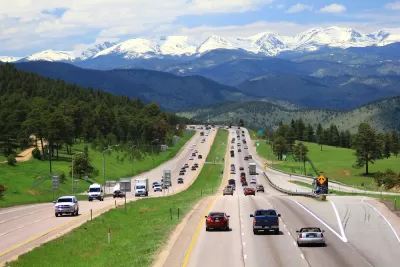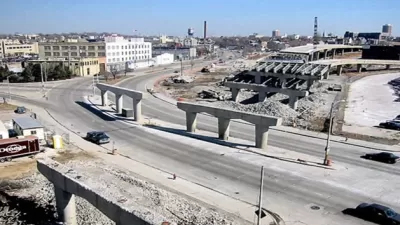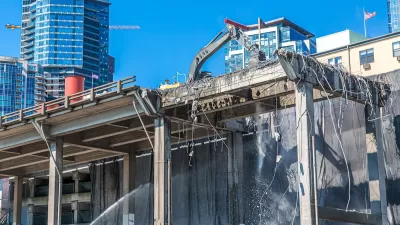While the department has canceled some road expansion projects, the agency has no plans to remove highways, calling them the “bread and butter” of the state’s transportation network.

Don’t expect Colorado’s Department of Transportation (CDOT) to begin any major highway removal projects in the foreseeable future, writes Nathaniel Minor for Colorado Public Radio. A new state law requires the CDOT to shift funding priority toward projects that would decrease greenhouse gas emissions from the state's transportation systems.
In an interview with Colorado Matters host Ryan Warner, CDOT Executive Director Shoshana Lew said “Highways are incredibly fundamental to what CDOT does,” calling the highway system “the bread and butter that connects a very large state and allows different parts of the state to connect to one another.” Lew added that “CDOT is also committed to broadening travel choices by boosting public transportation service and traffic-calming ‘complete street’ rebuilds to better serve pedestrians, cyclists and transit riders.”
Lew also spoke on the state’s Bustang and Pegasus transit services, which shuttle people to the mountains, the benefits to neighborhoods of removing old viaducts in Denver, and why CDOT is adding toll lanes to some of the state’s roads. Overall, Lew focused on the agency’s goal to “give people as many choices as possible.”
Addressing criticism that CDOT contracting policies privilege large companies over smaller, local businesses, Lew noted that the scale of some projects makes them unfeasible for smaller companies. “[T]he contractor that's going to have the skill set to do a big project like a rebuild on I-25 is probably not the same one that's going to do a rural guardrail project.”
FULL STORY: CDOT may be slowing highway expansions, but don’t expect any highway removals

Alabama: Trump Terminates Settlements for Black Communities Harmed By Raw Sewage
Trump deemed the landmark civil rights agreement “illegal DEI and environmental justice policy.”

Planetizen Federal Action Tracker
A weekly monitor of how Trump’s orders and actions are impacting planners and planning in America.

The 120 Year Old Tiny Home Villages That Sheltered San Francisco’s Earthquake Refugees
More than a century ago, San Francisco mobilized to house thousands of residents displaced by the 1906 earthquake. Could their strategy offer a model for the present?

In Both Crashes and Crime, Public Transportation is Far Safer than Driving
Contrary to popular assumptions, public transportation has far lower crash and crime rates than automobile travel. For safer communities, improve and encourage transit travel.

Report: Zoning Reforms Should Complement Nashville’s Ambitious Transit Plan
Without reform, restrictive zoning codes will limit the impact of the city’s planned transit expansion and could exclude some of the residents who depend on transit the most.

Judge Orders Release of Frozen IRA, IIJA Funding
The decision is a victory for environmental groups who charged that freezing funds for critical infrastructure and disaster response programs caused “real and irreparable harm” to communities.
Urban Design for Planners 1: Software Tools
This six-course series explores essential urban design concepts using open source software and equips planners with the tools they need to participate fully in the urban design process.
Planning for Universal Design
Learn the tools for implementing Universal Design in planning regulations.
Clanton & Associates, Inc.
Jessamine County Fiscal Court
Institute for Housing and Urban Development Studies (IHS)
City of Grandview
Harvard GSD Executive Education
Toledo-Lucas County Plan Commissions
Salt Lake City
NYU Wagner Graduate School of Public Service





























